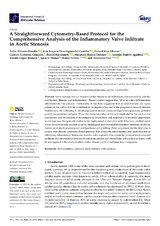A Straightforward Cytometry-Based Protocol for the Comprehensive Analysis of the Inflammatory Valve Infiltrate in Aortic Stenosis
Autor
Álvarez-Heredia, Pablo
Domínguez-del-Castillo, José Joaquín
Reina-Alfonso, Irene
Gutiérrez-González, Carmen
Hassouneh, Fakhri
Batista-Duharte, Alexander
Trujillo-Aguilera, Antonio
López-Romero, Rosalía
Muñoz, Ignacio
Pera, Alejandra
Editor
MDPIFecha
2023Materia
Flow cytometryProtocol
Aortic stenosis
Inflammation
METS:
Mostrar el registro METSPREMIS:
Mostrar el registro PREMISMetadatos
Mostrar el registro completo del ítemResumen
Aortic stenosis (AS) is a frequent cardiac disease in old individuals, characterized by valvular calcification, fibrosis, and inflammation. Recent studies suggest that AS is an active inflammatory atherosclerotic-like process. Particularly, it has been suggested that several immune cell types, present in the valve infiltrate, contribute to its degeneration and to the progression toward stenosis. Furthermore, the infiltrating T cell subpopulations mainly consist of oligoclonal expansions, probably specific for persistent antigens. Thus, the characterization of the cells implicated in the aortic valve calcification and the analysis of the antigens to which those cells respond to is of utmost importance to develop new therapies alternative to the replacement of the valve itself. However, calcified aortic valves have been only studied so far by histological and immunohistochemical methods, unable to render an in-depth phenotypical and functional cell profiling. Here we present, for the first time, a simple and efficient cytometry-based protocol that allows the identification and quantification of infiltrating inflammatory leukocytes in aortic valve explants. Our cytometry protocol saves time and facilitates the simultaneous analysis of numerous surface and intracellular cell markers and may well be also applied to the study of other cardiac diseases with an inflammatory component.

